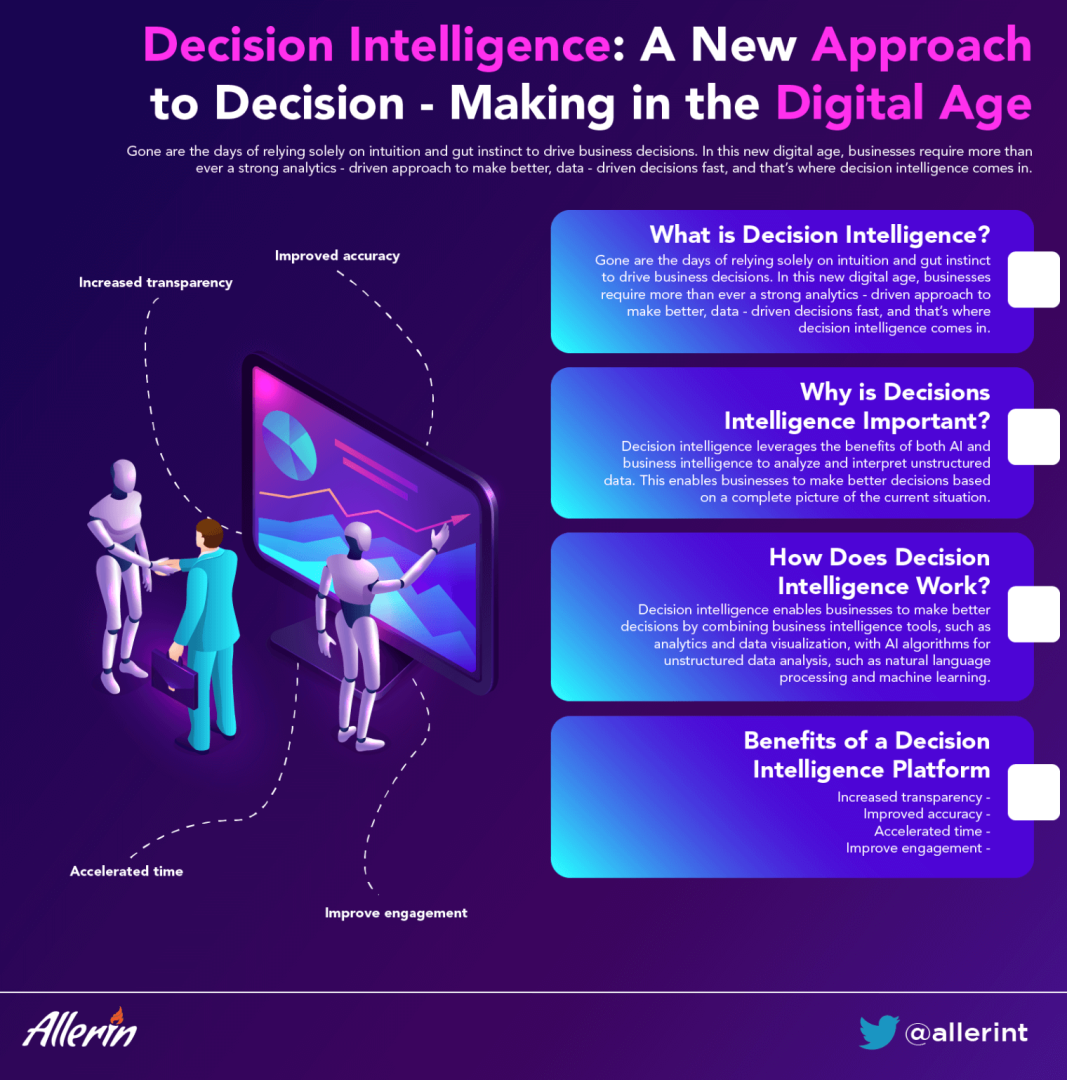Comments
- No comments found

Gone are the days of relying solely on intuition and gut instinct to drive business decisions.
In this new digital age, businesses require more than ever a strong analytics-driven approach to make better, data-driven decisions fast, and that’s where decision intelligence comes in.
Many people react with the same skeptical response when they hear the word “intelligence” applied to anything related to business processes or technology. It commonly conjures images of a super-smart humanoid automaton that can think for itself and operate independently as an individual with its own set of unique human characteristics. Decision intelligence, however, refers to an approach and methodology for making fast, informed business decisions by combining artificial intelligence (AI) and machine learning algorithms with natural language processing, semantic analysis, and other technologies.
Decision intelligence is a hybrid approach to decision-making that combines business intelligence and artificial intelligence to drive data insights and actionable recommendations. Decision intelligence leverages business intelligence tools, such as analytics and data visualization, to generate insights. AI is then used to evaluate and analyze unstructured data, such as text documents or customer feedback, to generate differentiated insights by applying natural language processing and machine learning algorithms. The resulting insights are then delivered in a user-friendly format via a decision intelligence platform. This platform can be an integrated tool or standalone software that enables businesses to collect, visualize and analyze data from various sources, such as online surveys, customer feedback, and social media engagement.

Business decisions can only be as good as the quality of the data that informs those decisions. To understand the true state of affairs, you must look at all available data sources, including internal data, public data and data from your customers. Data sources such as customer surveys, social media engagement, and call center audio can help you to get a more accurate picture of your customers’ needs and drive actionable insights. However, these are merely unstructured data sources that are difficult to analyze and interpret with traditional business intelligence tools. To bridge this gap, decision intelligence leverages the benefits of both AI and business intelligence to analyze and interpret unstructured data. This enables businesses to make better decisions based on a complete picture of the current situation.
Decision intelligence enables businesses to make better decisions by combining business intelligence tools, such as analytics and data visualization, with AI algorithms for unstructured data analysis, such as natural language processing and machine learning. Decision intelligence data visualization tools help you understand your data better by presenting it in a more accessible format, such as charts and graphs. Business intelligence tools are crucial to helping you to get insights from your data. This is where decision intelligence makes use of AI for unstructured data analysis to provide differentiated insights. The unstructured data that decision intelligence analyzes can include customer feedback, audio from call centers, and text from documents. Decision intelligence can be applied to a variety of data sources to identify key issues and insights. You can use decision intelligence to identify product or service issues, such as unfulfilled customer needs or pain points. You can also use it to inform your marketing strategy by identifying your target audience’s needs and preferences.
Decision intelligence offers many benefits. It allows you to understand the provenance of your data, which means that you can trace your data sources and ensure they are reliable. Additionally, decision intelligence accelerates time to insight by using AI algorithms to analyze unstructured data. This means that decision intelligence can take less time to generate than traditional business intelligence tools. Decision intelligence also offers benefits for customer engagement. Decision intelligence can help businesses better understand their customer’s needs and provide a more personalized and customized experience.
Decision intelligence is a hybrid approach to decision-making that combines business intelligence and AI algorithms for unstructured data analysis. It enables businesses to make better decisions by providing more accurate and detailed insights from a variety of data sources.
Naveen is the Founder and CEO of Allerin, a software solutions provider that delivers innovative and agile solutions that enable to automate, inspire and impress. He is a seasoned professional with more than 20 years of experience, with extensive experience in customizing open source products for cost optimizations of large scale IT deployment. He is currently working on Internet of Things solutions with Big Data Analytics. Naveen completed his programming qualifications in various Indian institutes.
Leave your comments
Post comment as a guest